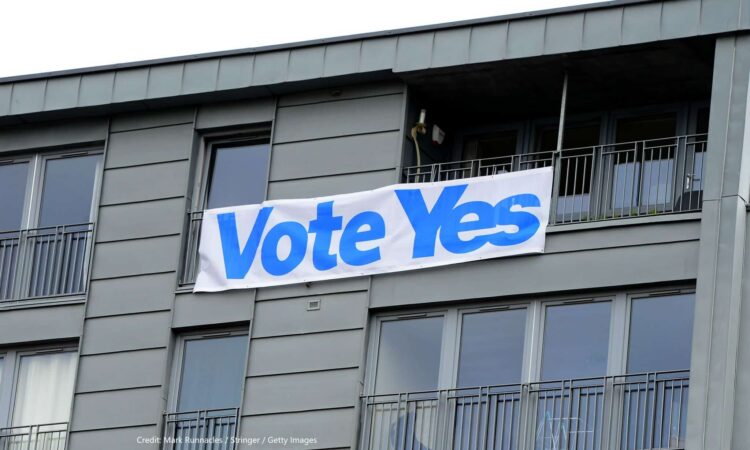
Toine Paulissen sets out the findings of a recent article on referendum campaign finance regulation which highlights a loophole through which spending limits can be circumvented and suggests that this be reformed to ensure a level playing field.
Love it or hate it, referendums remain a hot topic in the United Kingdom. Much like in Hollywood, the attention mainly goes to reboots and remakes: a second referendum on Scottish independence, for instance, or how about another vote on EU membership? Further votes on these subjects might seem unlikely in the near future but it is not out of the question that the UK will eventually see another blockbuster referendum.
But if the UK wants future campaigns to be level playing-fields which empower the people to express their will, then it may be necessary to reform the financial regulations governing referendum campaigns.
The UK already has an extensive regulatory framework in this regard in the Political Parties, Elections and Referendums Act (PPERA) 2000, which includes provisions on expenditure, transparency, and public and private income of referendum campaigners. Ideally, these regulations create ‘regulated equality’: both sides in a campaign are equally and fairly represented, allowing voters to make an informed decision with full knowledge of the policy consequences. At the same time, they should help keep the spectre of corruption at bay.
However, my newly published study with Bart Maddens has shown that these regulations are instead very susceptible to misconduct, especially from political parties. This is for several reasons.
For starters, while Permitted Participants (i.e. political parties and other actors allowed to be active in a referendum campaign) have specific expenditure limits during the course of a referendum campaign, they have virtually no restrictions in terms of private income. Anonymous donations or contributions from foreign interests are banned, but otherwise, Permitted Participants can accept donations from anyone and for any amount. Additionally, political parties do not need to earmark these donations as being related to a referendum campaign: instead, they are reported quarterly as general revenue from private contributions. Finally, donations made by Permitted Participants do not count towards their spending limit.
This creates a problematic cocktail of regulatory deficiencies through which spending limits can be circumvented, especially since donations are not counted as campaign expenditure. A Permitted Participant that has reached their campaign spending limit can theoretically still impact the vote by funneling money to another participant yet to reach its ceiling.
Our research highlights a specific example of this that occurred during the 2014 referendum on Scottish independence. Officially, the Scottish National Party stayed under its expenditure ceiling of £1,344,000 for this campaign; however, this does not take into account an additional £825,000 in donations to Yes Scotland Limited, the lead campaign organisation for the pro-independence side which also had a higher expenditure ceiling (£1,500,000). It can thus be argued that in practice, the party actually overspent their limit by about 58%.
The biggest problem here is that this loophole is completely legal under the current regulatory framework. Likewise, as we show in our research, the regulations make it possible for parties to create multiple affiliated campaigning organisations acting as individual Permitted Participants in referendum campaigns.
While this practice has up to now been used as a way to deal with members who disagree with the general party stance on the referendum topic, it also offers the possibility to ‘pool’ spending limits if parties can make unlimited donations to these organisations.
Parties themselves can also become vessels for spending limit circumvention: as the donations they receive are not earmarked, other Permitted Participants can make unlimited contributions to a party’s campaign. This is especially useful considering that party spending limits are often considerably higher than those of other campaigning organisations.
An even darker possibility is that actors who want to operate in the shadows and thus not register as a Permitted Participant can effectively camouflage their contributions as general donations for a party that just to happens to align with their views on a referendum topic. The fact that the donation and the identity of the donor would be registered and made public would potentially still make their goal obvious; however, said actors would still have a level of deniability that their contribution was aimed at influencing the referendum in question, and be able to avoid the public eye much more than a Permitted Participant could.
Why does all of this matter? Because it shows that the PPERA, while extensive, offers a number of possibilities for wealthy political parties to undermine the aforementioned ‘regulated equality’. And when referendum campaigns become lop-sided, voters are less likely to make decisions that protect their best interests as they might not receive all the information necessary to make said decision. When the playing field isn’t level, and a side with more resources can potentially circumvent the spending limits, it creates an incentive for politicians to use referendums purely to gain strategic benefits in the electoral or political arena, particularly if they have a financial advantage.
Our study has made clear that the current regulatory context when it comes to campaign finance does not necessarily guarantee equality between the participants. If parties with access to more resources feel that they have a potential advantage, it could make it more likely that future referendums in the UK are deployed merely as a means to reach specific strategic political goals.
While it doesn’t seem likely that there will be another vote any time soon, PPERA still needs to be future-proofed, especially in an increasingly volatile information context. Or the next referendum might turn out to be another blockbuster, for all the wrong reasons.
By Toine Paulissen, Flanders PhD Fellow in Political Science, KU Leuven.
This blog draws on an article by Toine Paulissen and Professor Bart Maddens published in Political Science. You can access the article ‘Referendum campaign financing by political parties: the case of the United Kingdom’ here.






